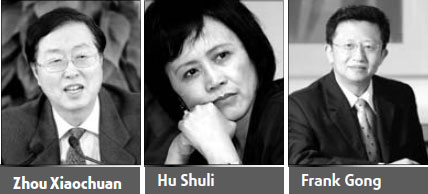


Editor's note: Much happened in China's capital market and many predictors emerged to forecast the up-and-down economy. Shanghai Securities News has selected some influential predictors and reviewed their forecast in 2008. As the newspaper comments, "their predictions, whether right or not, are citizens' free expressions and a kind of contribution to the public."
'The most inaccurate'
Zhou Xiaochuan, governor of the People's Bank of China, the central bank, has voiced concerns about the country's inflation problems since 2003.
Tight monetary polices have been adopted since 2007, the year that the central bank raised the interest rates six times and the reserve requirement ratio 10 times.
Some experts and scholars began to worry in March 2008 that the tightening monetary polices might affect small and medium-sized enterprises. At the same time people learned more about "import-oriented inflation", which was caused by the soaring price of international resources and raw materials.
However Zhou insisted on controlling monetary supply and credit growth until July 2008. His concerns about inflation did not change even in the first half of 2008, when snow wreaked havoc on the country's southern areas and May 12 earthquake hit Sichuan province.
Zhou said that "the most troubling problem of China's monetary policy is the anti-inflation fights," at a Shanghai forum on May 10.
The State Council, China's Cabinet, held three meetings in July to discuss China's economy. Then the policy for the second half of the year changed from "combating overheating and inflation" to "maintaining economic development and anti-inflation".
The CPI was over 8 percent in February, March and April, but dropped below 8 percent in May and has gone down since. Yet Zhou held his view of "raising interest rates as an option to fight against inflation".
The central bank released the second-quarter monetary policy report on Aug 15, which said "at present the factors that lead to higher prices still exist and inflation should be a major concern".
The central bank began to cut the interest rate and lower the reserve requirement ratio on Sept 16. Since then it has rolled out five interest rate cuts and lowered the RRR four times.
China's CPI decreased to 2.4 percent in November and stimulating the domestic economy became an all-important task. The consecutive interest rate cuts finally drowned out Zhou's anti-inflation voice.
'The most magic'
Frank Gong, JP Morgan's China chief economist, released a report on Aug 19 saying the Chinese government would take measures to "save the market". According to the report China was mulling an economic stimulus plan involving 200 billion yuan to 400 billion yuan, including measures to stabilize the domestic capital market.
Gong also predicted that the government would lower the reserve requirement ratio (RRR) by 0.5 percentage point in the second half of 2008.
Just one month after the report, the central bank lowered the RRR, dropping it 1 percentage point (or 2 percentage points for financial institutions located in the quake-hit areas of Sichuan province).
The central bank then announced that it would slash the RRR half a percentage point starting Oct 15.
The central bank announced on Nov 27 that it would lower the RRR of the country's large-scale money commercial banks and small and medium-sized banks by 1 percentage point and 2 percentage point respectively starting Dec 5.
Two months after Frank released the report, the government cleared a 4 trillion-yuan investment package to spur domestic demand and boost the slowing economy.
These figures generally coincide with Frank's prediction.
'The most hardhearted'
Hu Shuli, managing editor of China's best-selling financial magazine Caijing, followed the free market theory in Western countries and suggested the Chinese government not save the stock market, even when it faces great difficulties in development.
"The stock market can't be saved and should not be saved," she wrote in Caijing in April 2008. At that time many investors were disappointed with the market, believing the government wouldn't step in to stop it from collapsing.
But the government scrapped the stamp duty on stock purchases and announced it would buy shares in three of the largest State banks to bolster investor confidence on Sept 18. State-owned companies were encouraged to increase the proportion of their shares in listed companies or repurchase shares.
China's securities watchdog said share repurchase would no longer need approval on Sept 21, making it easier for listed companies to buy back their stocks. Later it said publicly traded companies must pay dividends in cash rather than stock over three years before submitting their refinancing applications.
China scrapped the tax levied on the interest income of individual stock accounts on Oct 26.
(China Daily 01/05/2009 page8)













